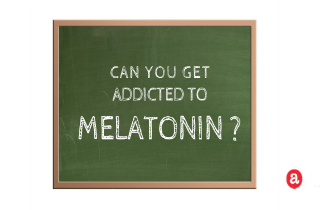The short answer is: we don’t know.
To date, researchers have not documented cases of melatonin addiction. But medications (even naturally occuring hormone supplements) are never entirely “risk free.” Still, therapeutic melatonin is less likely than other sedative-hypnotics to lead to dependence and abuse because using melatonin does not cause euphoria. So what is the relationship between melatonin and the body? We explore here.
Melatonin chemistry and use
Melatonin is a naturally occuring neuro-hormone which is synthesized by the pineal gland. Natural melatonin is thought to regulated sleep, mood, puberty, and ovarian cycles.
Melatonin supplements are still be investigated for use in people. This is because researchers think that melatonin plays a significant role in regulating the sleep-wake cycle. As a result, melatonin supplements have been used to help people sleep after circadian phase disorders such as jet lag and are being investigated in treatment of seasonal affective disorder (SAD). Whether or not melatonin supplement can treat primary or secondary insomnia is less well established.
Melatonin and the brain
Therapeutic melatonin may have sedative effects on the brain. Sedation is thought to occur through direct inhibition of a part of the brain called the suprachiasmatic nucleus. But, it should be noted here that melatonin (unlike other hypnotics or sedative medications) DOES NOT CAUSE euphoria, the “high” that people get and seek during drug abuse. This lack of euphoric effect significantly reduces addiction risk and makes melatonin a safer alternative to other sleeping aids.
Melatonin side effects
Melatonin appears to have a relatively benign side effect profile. In general, melatonin is well tolerated in the dose range of 0.1 mg-10 mg with few reported adverse events. The most commonly reported adverse effects of melatonin were
- nausea
- headache
- dizziness drowsiness
Is melatonin addiction possible?
Melatonin supplements are a relatively safe substance when used in the short term: over a period of days or weeks. Furthermore, melatonin has been shown to be safe at relatively high doses and in various formulations. However, the safety of melatonin when used over months and years, remains unclear.
Mixing melatonin with other substances
Melatonin can cause sleepiness and drowsiness. So taking melatonin with other prescription sedative medications might cause too much sleepiness. Some sedative medications that you should avoid while taking melatonin supplements include:
- clonazepam (Klonopin)
- lorazepam (Ativan)
- phenobarbital (Donnatal)
- zolpidem (Ambien)
Questions about melatonin dependency
Medications and supplements used to treat insomnia and sleep disorders have always been a source of concern for doctors and regulatory bodies. This is because various classes of agents have been associated with risks of abuse, dependency, and toxicity with overdose. But the naturally occurring hormone melatonin is perceived to be more safe.
If you are concerned that you have grown physically or mentally dependent on melatonin to sleep, please let us know. You can leave your questions, comments or feedback here and we will answer you personally and promptly.









Related Posts